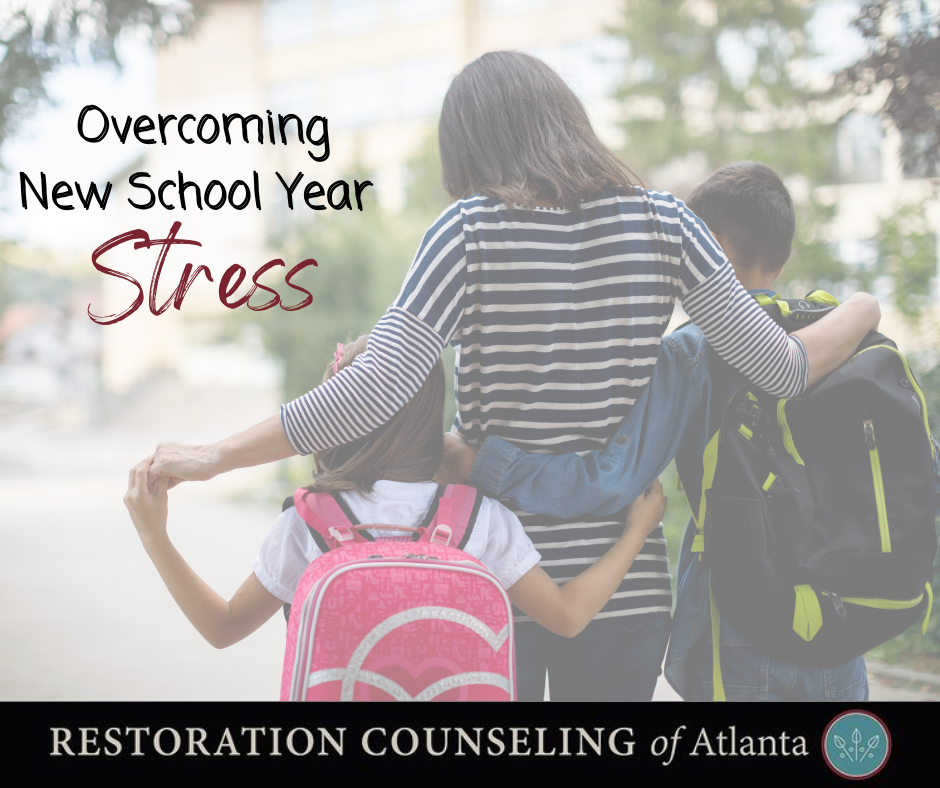The beginning of a new school year is filled with excitement and opportunity, along with plenty of stress and fear. Registration days, PTA signups, after-school programs, new teachers, new buildings, and new routines—it’s overwhelming for adults and kids! Here are a few tips for parents to help slow the New-Year-Fears and get off to a great start.
Have patience with your new routines.
Developing routines is vital for kids adjusting to a new schedule, but they take time to implement. The summer buzzed with pool days, vacations, and later wake-up times, so putting boundaries around sleep, meals, and activities is essential for your kiddos when school begins. However, parents need to be patient if kids aren’t in sync with your new routine right off the bat. We often want our children to see the intrinsic value in more sleep, better eating habits, and less video game time. Your perspective as a parent is different from your kids. Don’t be surprised if the first few weeks of school are filled with resistance, confusion, and frustration while you’re developing school-year routines. Have patience and consistency around your boundaries (and use some self-care!). Things will even out soon.
Use your support mode.
The excitement your kids feel the first few days of school can quickly be replaced with stress from all they are expected to do. Kids react to this stress in a few different ways. Some get super-organized and head straight into the challenge with a notebook full of color-coded dividers. Others fear they won’t be able to complete the requirements, so they shut down, distract themselves, or decide they just won’t care this year. These responses can shift quickly and all be displayed by the same child in the same week. Often parents meet these reactions with fear and anxiety, worrying their child will get off on the wrong foot and be unsuccessful. These fears are normal, but instead of demanding a change in attitude, find ways to support your child.
Look past their unhelpful coping mechanisms and see if you can help them articulate what they are feeling. Giving them language for their feelings helps them feel understood. Recognize their frustrations around new tasks and assignments and help them break them down into small, achievable steps. Short-term solutions help students feel more confident that they can handle what’s ahead. We all want everything to go as planned at the start of a new year, but it’s best to prepare yourself for when things go wrong.
Plan ahead together.
The schedule in August and September seems non-stop. There’s just so much to do. Remember that even if your child seems to be handling it well, there’s still a limit to the number of new things they can deal with in these first few weeks. Remember that your kids are feeling this stress, too, even if they don’t outwardly show it or verbalize it. One quick way to induce a meltdown from your kids is to introduce an unexpected activity or event. Even things that are intended to be light and fun could trigger a big emotional response from your children during this time.
One solution is to talk with your kiddos on Sunday nights about the schedule of the week ahead. The simple act of letting everyone know what is coming is calming and reassuring. Use this time to discuss when buses arrive, what’s expected of everybody after school, and any out-of-the-ordinary activities that are planned. You might want to ask if they have things they’d like to add, like a shopping trip on Tuesday evening or a desire to go to the football game on Friday night. Your kids will have a ton to keep up with these first few weeks. Be on their team and help them navigate your expectations and theirs.
Be your kid’s biggest cheerleader.
Every parent I know wants the very best for their kids. They want them to be driven, successful, and happy. These hopes come from a place of love, but they can also have a tinge of fear. We worry about their futures and if they’ll be able to handle the challenges of life when they grow beyond high school age. There might even be a subconscious desire in us to show other parents that we are doing a good job. If you want your kids to feel supported and capable this time of year, check your own motivations. Research shows that children that feel supported, understood, and cheered for are much more likely to succeed in school and beyond. Be sure your expectations of your child’s success include the possibility of difficult moments. These difficult moments are when resiliency and self-confidence are formed. Be ready to support your kids through these moments and cheer them on when they have success. They know you want them to do well. Be there for them when it’s not going as well as you had hoped.
You got this, parents! Have a great year!
If you need extra support this time of year, feel free to reach out to me.
 Written by: Josh Thames, M.Ed, MS, APC
Written by: Josh Thames, M.Ed, MS, APC
Roswell Location
Buckhead Location
Josh works with adolescents, teenagers, couples, and adult males. He spent 14 years as an educator before becoming a counselor. He connects well with young people and their families, so they feel heard, honored, and understood.

